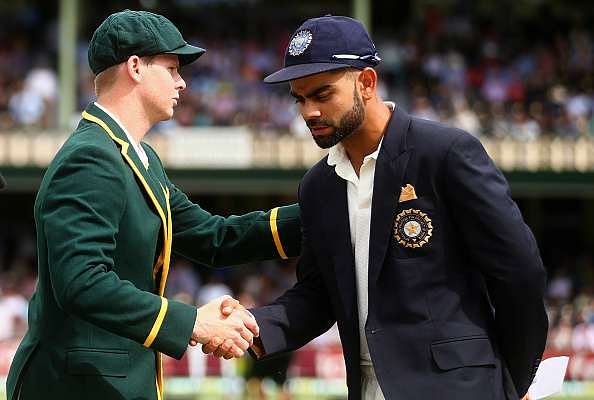
Is Virat Kohli obligated to be friends with players of the opposing team?

Much has been said and written about Virat Kohli’s comments in the press conference wherein he implied that he no longer considered anyone in the Australian touring party his friend. The reaction from the media and fans, especially those based in Australia, has been largely negative, and seemingly everyone and anyone has had a go at Kohli for what he said.
However, the question that must be asked is whether Kohli is obligated to be friends with the players of the opposing team. There can only be one answer to this question – NO. Like everyone else, Kohli is free to decide who he considers his friends and who he doesn’t.
It is very strange that it has come as a surprise to people that Kohli has opted to put the Australian players, who constantly abused him and tried to ridicule him at every opportunity, in the ‘not-friends’ bracket. Kohli effectively just said that if Australia feel that they need to abuse and belittle their rivals to have a chance to win, then they are free to do so, but then don’t except the players who are the subjects of said abuse and ridicule, to consider them their friends.
It is a personal choice which should be respected, and the furore surrounding the Indian skipper’s remark is very odd, to say the least. Not being friends with those you play against is not something that breaks the norms of sportsmanship by any stretch of the imagination.
The Indian skipper still shook hands with those same players once the match, and the series was over, and in that same press conference, Virat Kohli was full of praise for the Australian team and how well they competed during the tour.
Belittling a rival player and mocking his limitations is much more than just banter and ventures into the bracket of disrespect.The things that were said during the games went far beyond just banter and transgressed into a territory of things that friends don’t say to each other. Australia’s keeper Matthew Wade, for instance, told Jadeja that he is good enough to only play in India.
At the very least, such statements cannot be considered to be within the bounds of decent human behaviour. Jadeja had to bear this belittling for just one test, whereas Kohli was the target for the entire series!
Also Read: Why Virat Kohli is right to say friendship over with the Australians
The point is not to say that sledging or mental disintegration, as Steve Waugh once put it, is not good, nor is the point to judge Australian players for going to such lengths to seek an edge in a very closely fought series. The Kangaroos were not here to make friends and with the series on the line, Australia, being the tough team that they are, were pulling out all tricks from the bag.
While ridiculing a player’s limitations through such caustic statements can never be within the spirit of the gentleman’s game, but they don’t break any rules, and the Australian players, and indeed Indian players, were free to resort to such tactics.
Even so, despite the unpleasantness, it’s worth reiterating, Kohli still shook hands with all the Australian players and showered praise on them during the post-series press conference. Kohli’s words amply showed that he still had plenty of admiration for Australia’s performance in the series.
Australia have been known to play tough cricket and are renowned for hurling verbal bouncers at their opponents during matches, but in all these years no Australian captain has ever had to apologise. At the end of the Border-Gavaskar series, Steve Smith apologised not once, but twice, and that in itself is a clear indication that Australia went too far and crossed the line.
Should they have crossed the line? Why not! It was a fierce contest between the top two teams in Test cricket, and Australia were within their rights to try every legal trick in the book to force a historic win.
Has Kohli said Australia should not have pushed the boundaries? No. If anything, Kohli was effusive with his praise for the Australian team.
It is important to understand this distinction between saying Australian players were wrong to do what they did (which Kohli didn’t say) and saying something like- ‘I thought we were friends and while we competed hard, I thought some lines wouldn’t be crossed; but they were crossed, and so I was clearly wrong about us being friends in the first place (which is what Kohli was implying).
The most recent edition of the Border-Gavaskar series will be remembered fondly by fans of both teams and indeed neutrals, for years to come. There is no need to mar the final chapter by misinterpreting Kohli’s words as implying a loss of respect for Australian players, or a condemnation of their tactics
Kohli’s statement was not meant to show disrespect towards the Australian team, nor disapproval. It was just a re-assessment of personal relations in light of how things went down in the series.
Ultimately Kohli is free to decide who he considers his friends, and it is a judgement he alone can make, and he has made it. It is a personal choice that needs to be respected, both by the fans and media alike.